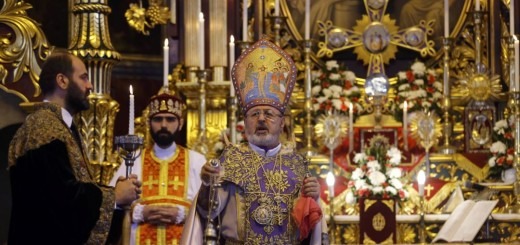To Ban Genocide Denial, Court Incites Armenians to Commit Violence
In the case of Dogu Perincek vs. Switzerland, the Grand Chamber of the European Court of Human Rights (ECHR) sustained in a 10-7 vote the Turkish politician’s right to free expression, finding that Swiss courts had wrongly convicted him for denying the Armenian Genocide.
More importantly for Armenians, the Grand Chamber contradicted the Lower Chamber’s unwarranted opinion of Dec. 17, 2013, which had questioned the validity of the Armenian Genocide. On October 15, 2015, ECHR’s Grand Chamber rectified that jurisdictional issue, ruling that the Court was “not required to determine whether the massacres and mass deportations suffered by the Armenian people at the hands of the Ottoman Empire from 1915 onwards can be characterized as genocide within the meaning of that term under international law, but has no authority to make legally binding pronouncements, one way or another, on this point.” This was the judgment of the majority of 10 judges who ruled in favor of Perincek.
The remaining seven judges, not only disagreed with the majority’s ruling in support of Perincek, but went on to set the record straight on the Armenian Genocide: “That the massacres and deportations suffered by the Armenian people constituted genocide is self-evident…. The Armenian genocide is a clearly established historical fact. To deny it is to deny the obvious. But that is not the question here. The case is not about the historical truth, or the legal characterization of the events of 1915. The real issue at stake here is whether it is possible for a State, without overstepping its margin of appreciation [limited room to maneuver], to make it a criminal offence to insult the memory of a people that has suffered genocide. In our view, this is indeed possible,” the seven judges wrote in their dissenting opinion.
Nevertheless, the Grand Chamber still reached some unwarranted conclusions that defy logic and common sense. The majority of the judges advanced the meaningless argument that since 90 years had passed between Perincek’s statements and “the tragic events” of 1915, there was no need for Switzerland to regulate his speech. Supposedly, the passage of time had made his denial less traumatic on Armenians. As the dissenting seven judges pointed out, the majority’s position violates “the principle that statutory limitations are not applicable to war crimes and crimes against humanity.”
The majority of the judges also put forward a questionable argument to justify why denying the Holocaust was a crime, and not a violation of freedom of expression. They considered Holocaust denial an “antidemocratic ideology” and “anti-Semitism,” whereas they claimed that Perincek’s denial of the Armenian Genocide did not result “in serious friction between Armenians and Turks” in Switzerland. Furthermore, while asserting that there was a direct link between Holocaust denial and many of the European “States which had experienced the Nazi horrors,” they found no such link between Switzerland and the Armenian Genocide.
There are several problems in the Judges preceding arguments:
— There should not be a double standard in dealing with denial of any genocide. If denial of the Holocaust is a crime, so should the denial of other genocides. The preferential treatment of victims of certain genocides, but not others, is shameful and disgraceful. As editor of a newspaper in the United States, I naturally support the highly protective American notion of freedom of expression rather than the European model of a more restrictive freedom of speech. However, regardless of which legal system one adheres to, discrimination among genocide victims is not acceptable.
— Majority of the judges repeatedly claimed that since Perincek’s denial did not result in causing public disorder by the Armenian community, Swiss courts should not have convicted him. Ironically, by making such a dangerous assertion, the Grand Chamber is actually inciting Armenians to resort to violence to satisfy the Court’s requirement that genocide denial could only be criminalized if it is followed by some sort of violent reaction. Since Swiss-Armenians acted in a civilized manner by calling the police and filing a lawsuit instead of bashing Perincek’s head, they are now being told that their legal claim is invalid because they did not cause a public disturbance!
— It is historically wrong to state that there was no link between Switzerland and the Armenian Genocide. Over 400,000 Swiss citizens signed a petition in 1890’s to protest the Hamidian massacres. Swiss missionaries saved countless orphans during the Genocide and helped provide new homes for them in Switzerland.
Fortunately, the Grand Chamber did not require Switzerland to amend its laws on genocide denial, implying that the law was simply misapplied in Perincek’s case. Therefore, Greece, Cyprus, and Slovakia also do not need to change their laws on criminalizing denial of the Armenian Genocide.
Thankfully, the Court rejected Perincek’s claim that he is entitled to 135,000 euros ($142,000) in damages and court costs.
International lawyers Geoffrey Robertson and Amal Clooney, and Armenia’s Prosecutor General Gevork Kostanyan should be commended for their exceptional efforts in representing Armenia in Court and defending the truth of the Armenian Genocide.








Watch out Mr. Harut with your threat of terror…The ASALA and Justice Commandos were educated in Bekaa Valley by Hezbullah… Murat Topallian had collected large some from Armenians in USA to have their young sons educated in killing innocents.Since then, things improved for much worse… Do you want to provoke fanatics so that they send some “walking bombs” to California to retalliate violence which you encourage, in the latest fashion? I hear that prices for suicide bombers has gone low, since they will be rewarded in paradise!